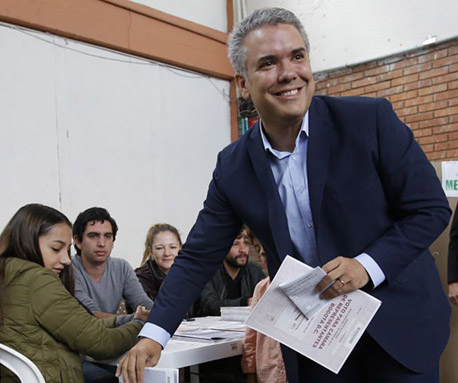BOGOTA, (Reuters) – Thousands of protesters took to streets of Colombia’s capital Bogota yesterday for a fifth day of demonstrations over issues including economic reforms, police violence and corruption as President Ivan Duque met with unions and business leaders.
The protests began with a 250,000-person march last week and have been marked by widespread neighborhood “cacerolazo” demonstrations – a traditional Latin American protest in which people bang pots and pans.
Protesters of all ages have declared themselves against rumored economic plans such as a cut to the minimum wage for young people that Duque denies supporting. They have also highlighted what they say is a lack of government action to stop the murder of hundreds of human rights activists.
Duque has promised a “great national dialogue” focused on social issues and the fight against corruption to run through mid-March and invited citizens to submit proposals for how to improve Colombia. Duque was meeting on Monday afternoon with business representatives, as well as the unions that organized the original march.
Many protesters are also demanding the government fully implement a 2016 peace deal with Revolutionary Armed Forces of Colombia (FARC) rebels, which Duque unsuccessfully tried to modify, and Monday also marked International Day for the Elimination of Violence against Women.
“Old people in this country are accustomed to deaths being just one more statistic, and we want that to begin to change,” said design student Sofia Murcia, 20, standing with friends carrying white flowers. “We’re here not to wash our hands; if you do nothing, you’re complicit.”
Tactics used by riot police to disperse demonstrations, including the use of tear gas and sound grenades, have angered many, especially after 18-year-old protester Dilan Cruz was gravely injured on Saturday afternoon.
Monday’s march took protesters past San Ignacio hospital where Cruz remains in critical condition, with demonstrators chanting “Be strong Dilan!” as they passed. Cruz’s condition had worsened and was “irreversible,” the hospital said.
The protests have been largely peaceful, despite isolated looting in some areas and the institution of overnight curfews in Bogota and Cali.
The government has said three people were killed following Thursday’s protests in incidents the police said involved looting. More than 340 police officers have so far been injured.
The protests have coincided with demonstrations elsewhere in Latin America, from anti-austerity marches in Chile, inflamed tensions in Ecuador and Nicaragua and protests over a fraught election in Bolivia that led President Evo Morales to resign.






